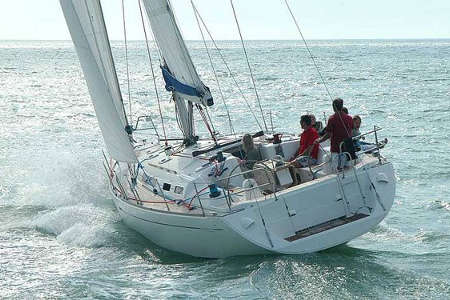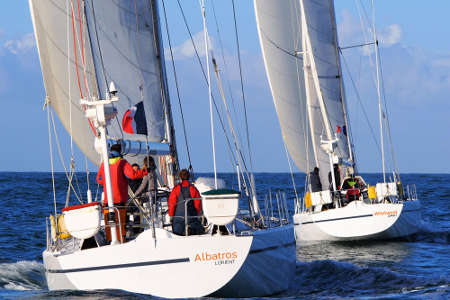France and its overseas territories offer an exceptional variety of coastlines, allowing sailors to experience all types of navigation conditions year-round.
Yakapartir on TV...
There’s something for everyone, and at (almost) any price! But without traveling far, you can train effectively for sailing cruises without breaking the bank.


Most aspiring sailors are driven by the call of the open sea, inspired by the simple act of gazing at the ocean. Leaving the beach, exploring the hidden corners of an island, or crossing the horizon to conquer the world and oneself are all reasons to attend a sailing school.
However, proper training allows you to learn much faster than relying on advice from those "in the know." A good skipper is not necessarily a good teacher, and teaching is a skill that must also be learned.
The first step is to take the time to discover the activity. A weekend at a cruising school will help you validate (or challenge) your preconceived notions about sailing. If it's a yes, then great. If it's a "meh" or even "nope," you'll be glad you didn’t immediately sign up for a full training package, avoiding an early depletion of your next vacation budget.
The second step is to clarify your goals. If you're unsure of what you want, a crew member training program will suffice to "volunteer" your skills in the recreational sailing community. This can allow you to embark on short, medium, or even long-term trips aboard private boats owned by people looking for affordable help. However, be cautious about joining long crossings with just anyone!
If, on the other hand, your dream is to truly set sail for good, then you'll need to commit to comprehensive skipper training. Ready to take the leap? Let's go!
For both financial and "vacation-related" reasons, a training program typically spans two seasons or more. Expect about three years for a final goal of coastal cruising and five years to prepare for a long-term voyage.
Our advice: at sea, gaps in knowledge often come at a high price. It’s unrealistic to think you can become fully autonomous in just a few weeks.
These are foundational skills that will need to be reinforced by a multitude of experiences, which can only be gained over time and through practice.
As such, there’s no skipping steps: it’s better to take the time to "repeat" advanced-level courses and "rack up the miles" before finding yourself alone in stressful situations.
Before you dive in, consider that a boat is a confined space where proximity requires good relationships. Before starting your search, ask yourself about your preferred style of cruising school: do you want demanding but effective training, or a more relaxed atmosphere since you're on vacation, even if it takes a bit longer?
Once you've decided, target the profiles of different cruising schools by checking user reviews online.
Some schools are affiliated with the Fédération Française de Voile (French Sailing Federation). This affiliation allows you to validate levels and switch between structures if you wish—whether to change sailing locations or to learn different techniques.
You can also choose a non-affiliated sailing school. In practice, it’s unlikely you’ll be turned away for not having your “sailing passport” in hand...
Many independent cruising schools are run by competent skippers. In such cases, consider asking the instructor for a written assessment of your level at the end of the course. School managers must hold a Brevet d'État d'Éducateur Sportif Voile or a BPJEPS certification.
Once you know whether you want to relax or dive into intensive training, the Internet is your best tool. The Paris Boat Show, held each December, is also an excellent place to explore your options.
Expect to pay an average of €700 for a week of training.
With serious effort, a week is enough to validate one of the five levels of practice approved by the Fédération Française de Voile.
Level 5, "skipper," allows you to rent a boat in manageable weather conditions—a very solid starting point.
While this may seem expensive, consider that life has no price, and training costs are just a fraction of the price of a boat.
Les Guides du Grand Large
Les Guides du Grand Large offer:
Les Glénans
Founded by resistant journalist Philippe Viannay after WWII, Les Glénans remains an international reference for cruising education. With several locations from Brittany to the Mediterranean, they offer beginner courses onshore and intensive offshore or semi-offshore experiences. Courses are run by volunteers.
UCPA
A well-established organization offering a wide range of destinations in France, the Caribbean, and Cuba, accessible even to children. A classic choice to learn while enjoying vacation. Courses are run by volunteers.
TML
The Trans Mer Le Havre association, two hours from Paris, offers training on fast, modern cruisers. Simple and effective. Professional instructors.
Yakapartir
A La Rochelle reference for over 15 years, this association offers onboard training from one day to a week or more for transatlantic and transpacific destinations. Professional instructors.
Challenge Océan
Based in Lorient, Challenge Océan offers coastal or offshore cruising courses aboard beautiful 20-meter boats. Possibility of transatlantic crossings and beyond! Professional instructors.
ACM
Specializing in cruising catamarans, this rare school offers tailored programs for boat owners in the Mediterranean, Atlantic, and Caribbean. Professional instructors.
Maïmiti Catamaran
Specialized in catamaran navigation, Maïmiti Catamaran, led by Gilles, offers personalized training combining theory and intensive practice in the Mediterranean setting.
Join as a crew member
Crew-matching sites connect boat owners with volunteer crew willing to contribute to onboard expenses.
Vogue avec moi: Cruises with cost-sharing opportunities.
Sail the World: Focused on long voyages and popular with seasoned sailors.
France and its overseas territories offer an exceptional variety of coastlines, allowing sailors to experience all types of navigation conditions year-round.
Yakapartir on TV...
There’s something for everyone, and at (almost) any price! But without traveling far, you can train effectively for sailing cruises without breaking the bank.


Most aspiring sailors are driven by the call of the open sea, inspired by the simple act of gazing at the ocean. Leaving the beach, exploring the hidden corners of an island, or crossing the horizon to conquer the world and oneself are all reasons to attend a sailing school.
However, proper training allows you to learn much faster than relying on advice from those "in the know." A good skipper is not necessarily a good teacher, and teaching is a skill that must also be learned.
The first step is to take the time to discover the activity. A weekend at a cruising school will help you validate (or challenge) your preconceived notions about sailing. If it's a yes, then great. If it's a "meh" or even "nope," you'll be glad you didn’t immediately sign up for a full training package, avoiding an early depletion of your next vacation budget.
The second step is to clarify your goals. If you're unsure of what you want, a crew member training program will suffice to "volunteer" your skills in the recreational sailing community. This can allow you to embark on short, medium, or even long-term trips aboard private boats owned by people looking for affordable help. However, be cautious about joining long crossings with just anyone!
If, on the other hand, your dream is to truly set sail for good, then you'll need to commit to comprehensive skipper training. Ready to take the leap? Let's go!
For both financial and "vacation-related" reasons, a training program typically spans two seasons or more. Expect about three years for a final goal of coastal cruising and five years to prepare for a long-term voyage.
Our advice: at sea, gaps in knowledge often come at a high price. It’s unrealistic to think you can become fully autonomous in just a few weeks.
These are foundational skills that will need to be reinforced by a multitude of experiences, which can only be gained over time and through practice.
As such, there’s no skipping steps: it’s better to take the time to "repeat" advanced-level courses and "rack up the miles" before finding yourself alone in stressful situations.
Before you dive in, consider that a boat is a confined space where proximity requires good relationships. Before starting your search, ask yourself about your preferred style of cruising school: do you want demanding but effective training, or a more relaxed atmosphere since you're on vacation, even if it takes a bit longer?
Once you've decided, target the profiles of different cruising schools by checking user reviews online.
Some schools are affiliated with the Fédération Française de Voile (French Sailing Federation). This affiliation allows you to validate levels and switch between structures if you wish—whether to change sailing locations or to learn different techniques.
You can also choose a non-affiliated sailing school. In practice, it’s unlikely you’ll be turned away for not having your “sailing passport” in hand...
Many independent cruising schools are run by competent skippers. In such cases, consider asking the instructor for a written assessment of your level at the end of the course. School managers must hold a Brevet d'État d'Éducateur Sportif Voile or a BPJEPS certification.
Once you know whether you want to relax or dive into intensive training, the Internet is your best tool. The Paris Boat Show, held each December, is also an excellent place to explore your options.
Expect to pay an average of €700 for a week of training.
With serious effort, a week is enough to validate one of the five levels of practice approved by the Fédération Française de Voile.
Level 5, "skipper," allows you to rent a boat in manageable weather conditions—a very solid starting point.
While this may seem expensive, consider that life has no price, and training costs are just a fraction of the price of a boat.
Les Guides du Grand Large
Les Guides du Grand Large offer:
Les Glénans
Founded by resistant journalist Philippe Viannay after WWII, Les Glénans remains an international reference for cruising education. With several locations from Brittany to the Mediterranean, they offer beginner courses onshore and intensive offshore or semi-offshore experiences. Courses are run by volunteers.
UCPA
A well-established organization offering a wide range of destinations in France, the Caribbean, and Cuba, accessible even to children. A classic choice to learn while enjoying vacation. Courses are run by volunteers.
TML
The Trans Mer Le Havre association, two hours from Paris, offers training on fast, modern cruisers. Simple and effective. Professional instructors.
Yakapartir
A La Rochelle reference for over 15 years, this association offers onboard training from one day to a week or more for transatlantic and transpacific destinations. Professional instructors.
Challenge Océan
Based in Lorient, Challenge Océan offers coastal or offshore cruising courses aboard beautiful 20-meter boats. Possibility of transatlantic crossings and beyond! Professional instructors.
ACM
Specializing in cruising catamarans, this rare school offers tailored programs for boat owners in the Mediterranean, Atlantic, and Caribbean. Professional instructors.
Maïmiti Catamaran
Specialized in catamaran navigation, Maïmiti Catamaran, led by Gilles, offers personalized training combining theory and intensive practice in the Mediterranean setting.
Join as a crew member
Crew-matching sites connect boat owners with volunteer crew willing to contribute to onboard expenses.
Vogue avec moi: Cruises with cost-sharing opportunities.
Sail the World: Focused on long voyages and popular with seasoned sailors.